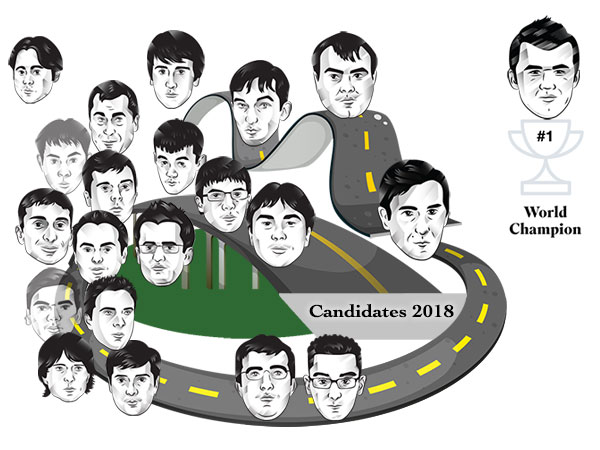


On Monday, World Chess, the organiser of the World Championship cycle and the commercial partner of FIDE, announced the dates and host city for the 2018 Candidates Tournament: Berlin, March 10-28. It will be an eight-player double round-robin (14 games), with the winner moving on to contest the World Championship in a match against Magnus Carlsen, the following November.

According to the World Chess press release, the tournament will take place in "Central Berlin" — although the venue is not mentioned — and represents a first for chess in the city. Previously the 2015 World Blitz and Rapid Championship was held at "BOLLE Meierei", a former dairy company in the Moabit neighborhood, but never a Candidates Tournament.
“[Chess] is immensely popular in this country, and we are very pleased to hold the tournament in Berlin and offer German fans a chance to witness this tournament live for the first time! We are also developing custom commentary and experiences in German for [the] local audience,” says Ilya Merenzon, CEO of World Chess.
Of the eight participants, only one is known: Sergey Karjakin of Russia, who was knocked out of the World Cup, but still automatically qualifies for the Candidates as the most recent World Championship challenger.
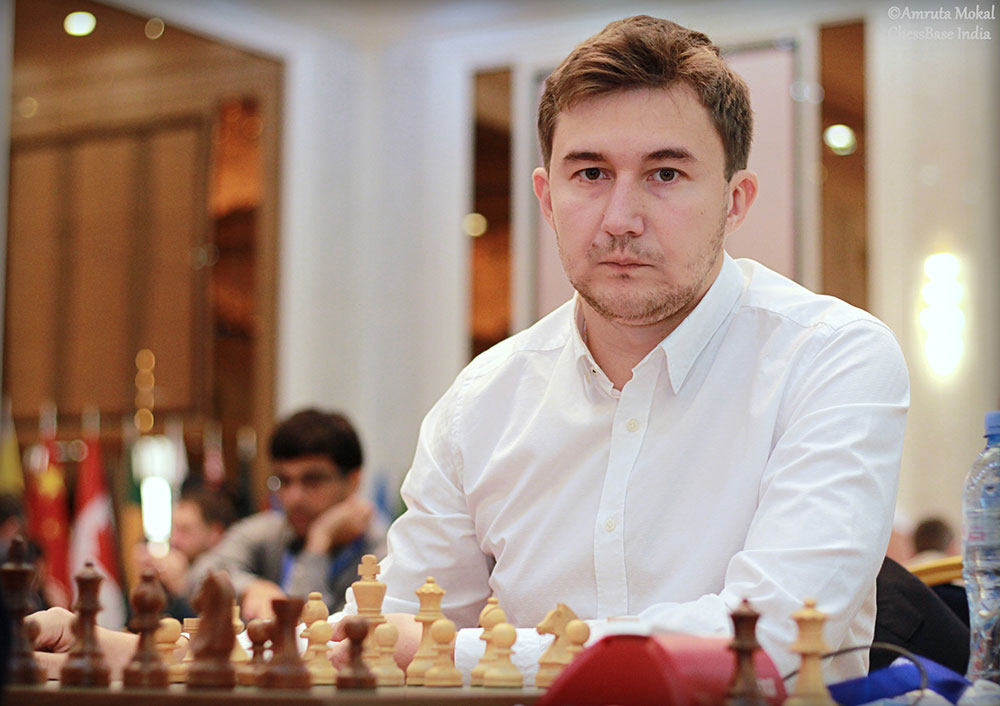
Karjakin's spot in the 2018 Candidates was earned in the March 2016 edition of the same
Each passing day brings us closer to knowing the identities of the remaining seven. Karjakin will be joined by the following (in order of when we'll know them):
Sounds simple enough, right?
But — and this is key — the list above is also the order of priority for qualification, in case someone qualifies via multiple criteria. So, for example, if Wesley So were to have the highest average rating, after reaching the finals of the World Cup, then he would get in through the latter, and a rating spot would go to the next highest.
Let's break down the current status of possible candidates:
As of now (and we'll keep this list updated over the coming weeks) the following grandmasters remain:
(Note: Consecutive names are paired with each other.)
The Grand Prix is a series of four tournaments, of which three have already been played. Twenty-four players are in the series, with each player participating in three of the four.
Of the top five scorers, two — Shakhriyar Mamedyarov and Grischuk — have already played in the first three events. But the rest have still one tournament remaining (November 16–27, in Palma, on the Spanish island of Majorca), and could theoretically overtake the leaders.
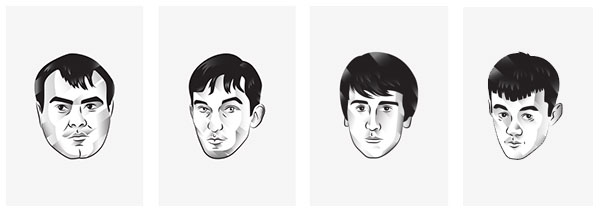
Mamedyarov, Grischuk, Radjabov, and Ding have good chances | Source: worldchess.com
Here are the current standings:
Points are scored based on the place a player finishes in each tournament, with the top five places awarding points as follows:
| Place | Grand Prix Points |
| 1st | 170 |
| 2nd | 140 |
| 3rd | 110 |
| 4th | 90 |
| 5th | 80 |
Therefore, Radjabov must finish in clear 3rd place or better to surpass Grischuk. Ding more or less must do the same, but since points are split, and he trails Radjabov by a point, it's a little complicated. For instance, if these two finish tied for 3rd-4th, they each earn 100 points. Radjabov would win the series outright, but Ding would tie for second with Mamedyarov at 340, and so the second qualification spot would be decided by tiebreak criteria. The first two tiebreaks are:
Mamedyarov has scored 16 game points, and Ding currently stands at 11, so he would need to score 5 or more in Palma. But if Ding scores 5 and ties, he wins on number of games with black, since Mamedyarov has played just twelve black games, while Ding already has played nine (so he will reach thirteen in Palma for sure). However this all may be moot: judging from the results of the first three tournaments, it's likely that Ding would need to score 5½, to accumulate enough Grand Prix points.
Vachier-Lagrave's task is tougher still; he needs either clear 2nd, or a tie for 1st (preferrably with no more than two others!) to wrack up enough Grand Prix points to ensure qualification.
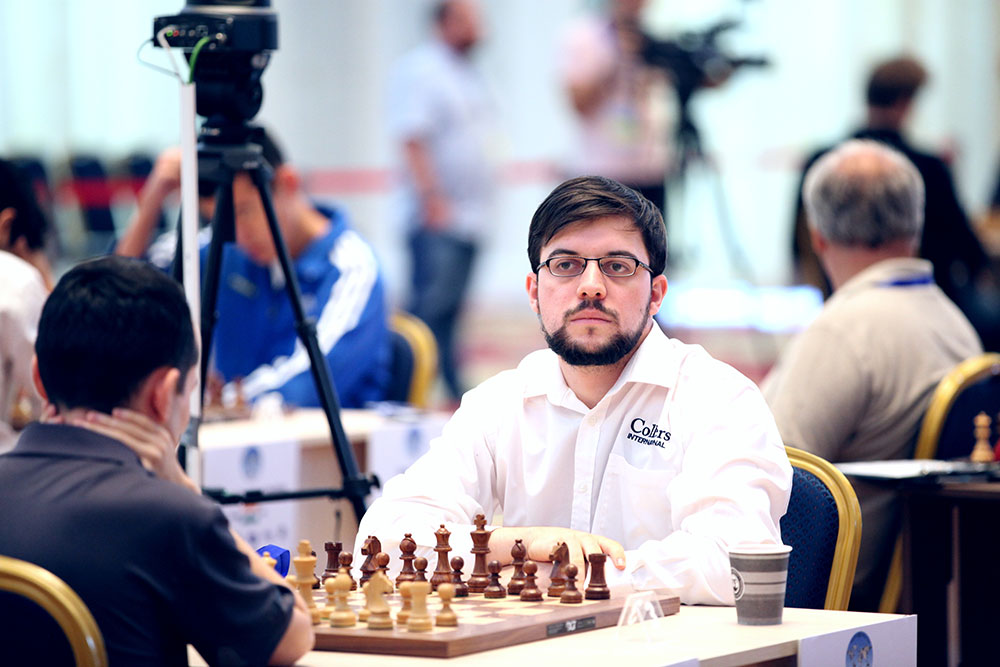
Vachier-Lagrave during his third round tiebreak | Photo: Anastasia Karlovich, tbilisi2017.fide.com
Hikaru Nakamura has virtually no chance. Aside from almost certainly needing to score clear 1st in Palma, he would also have to rely on Radjabov, Ding, and Vachier-Lagrave all finishing poorly, and, he would absolutely need Grischuk to win the World Cup (and thereby vacate his top spot in the Grand Prix). That's a bit ironic considering that there's no love lost between these two.
[Update, September 14: Grischuk was eliminated in the fourth round tiebreak, therefore Nakamura's only chance is a Wild Card spot.]
Even if Grischuk is knocked out, he would still have a good chance to remain in second place in the Grand Prix, although if any of his pursuers passes him, then he's out. It's fairly likely we'll see Mamedyarov in the Candidates.
According to the regulations:
For the purpose of deciding the 2 rated player qualifiers, the average from the following twelve FIDE rating lists will be used: the sum of all 12 monthly lists starting from 1st January 2017 to 1st December 2017 divided by 12.
Only two of Fabiano Caruana, Wesley So, and Vladimir Kramnik are likely to qualify on rating, but the race is extremely close, with only a single point separating their average ratings as of today. Martin Bennedik is tracking this day-by-day:
Breaking news: So overtakes Kramnik in average rating #fideworldcup
— Martin Bennedik (@bennedik) September 10, 2017
Caruana 2807 So 2806 Kramnik 2805https://t.co/MyzHaQu7uo
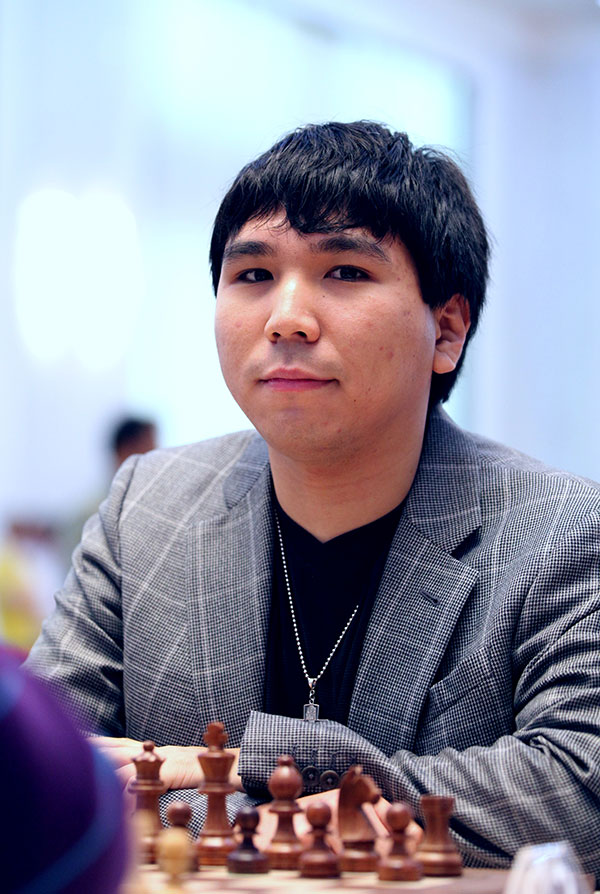 With So still playing in Tbilisi, anything can happen. Caruana and Kramnik are both expected to play in next month's Isle of Man open tournament, which will affect their November and December numbers. Of course both players will now be rooting for So to win the World Cup, as they would then be assured a rating qualification spot.
With So still playing in Tbilisi, anything can happen. Caruana and Kramnik are both expected to play in next month's Isle of Man open tournament, which will affect their November and December numbers. Of course both players will now be rooting for So to win the World Cup, as they would then be assured a rating qualification spot.
There is a very slim chance for Vachier-Lagrave (in fourth place) to make it by rating, but now that Caruana and Kramnik have been eliminated, he would have to go on a massive winning streak for the rest of the year.
It's worth pointing out that the World Cup has in fact seen a huge rating transfer away from the elite players (see 2700chess.com). Of the top 20, only Svidler's rating has gone up. Everybody else has watched his rating leak away including Caruana (-5.2), Kramnik (-9.2), and Vachier-Lagrave (-7.8, but still playing).
This remains a mystery. The idea of a wild card (or "organiser nominee") was once a kind of incentive for interested sponsors (public or private) to be involved in the Candidates funding. But now it seems to be up to the discretion of Agon / World Chess, and whether the announcement of Berlin has any impact on the pool of choices is unclear.
What is certain is that the potential wild card pick must hit a rating of at least 2725 on any 2017 FIDE list to be eligible. That reduces the pool to around 33 or so players (the year's not over yet), including all other possible candidates above.
Like the Grand Prix series, the Candidates will be sponsored by EG Capital Advisors, an international asset management company, as "Official Partner"; Kaspersky Lab as World Chess and FIDE "Official Cybersecurity Partner"; S.T. Dupont as "Official Writing Instrument"; and Isklar as "Official Water".
 The Agon press release notes, the Candidates Tournament "will be broadcasted [sic] exclusively on worldchess.com and on media partners’ sites", implying that their efforts to discourage websites from independently relaying the moves of the live games will continue. The legal theory underlying the exclusivity claim for displaying live moves has been rejected four times in court proceedings in Moscow and New York.
The Agon press release notes, the Candidates Tournament "will be broadcasted [sic] exclusively on worldchess.com and on media partners’ sites", implying that their efforts to discourage websites from independently relaying the moves of the live games will continue. The legal theory underlying the exclusivity claim for displaying live moves has been rejected four times in court proceedings in Moscow and New York.
One interesting new development is that the prize of €420,000, will be suplemented by 10% of the pay-per-view revenues from the event, with digital subscriptions expected to go on sale as early as October 4th.
Pay-per-view tickets will include, according to the press release, "German and English commentary, advanced analytics, behind-the-scenes footage, options to choose camera angles, and more, costing $15 altogether."
So, keep an eye on the official website for details in early October. The organization is not known for sticking to pre-announced dates — for instance, on June 7th, it was announced that the host city for the World Championship match itself would be revealed "in June of 2017". Nearly three months later, it remains unknown.
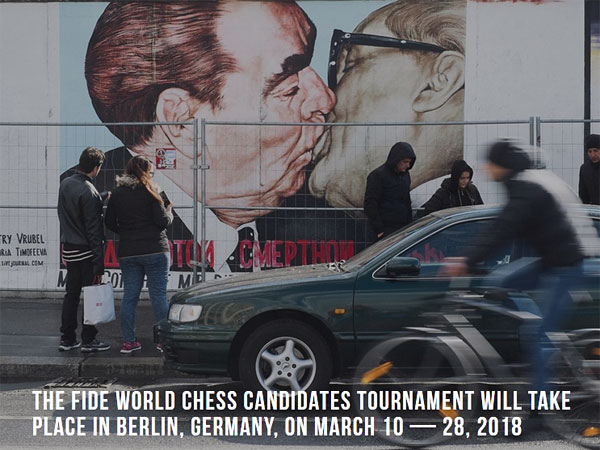
Part of the East Side Gallery, the longest preserved stretch of the Berlin wall | Photo: Max Avdeev / World Chess
|
March 9 Friday – Opening Ceremony |
March 19 Monday – Round 8 |
Karjakin, Aronian, Ding are in and the road just got a bit clearer:
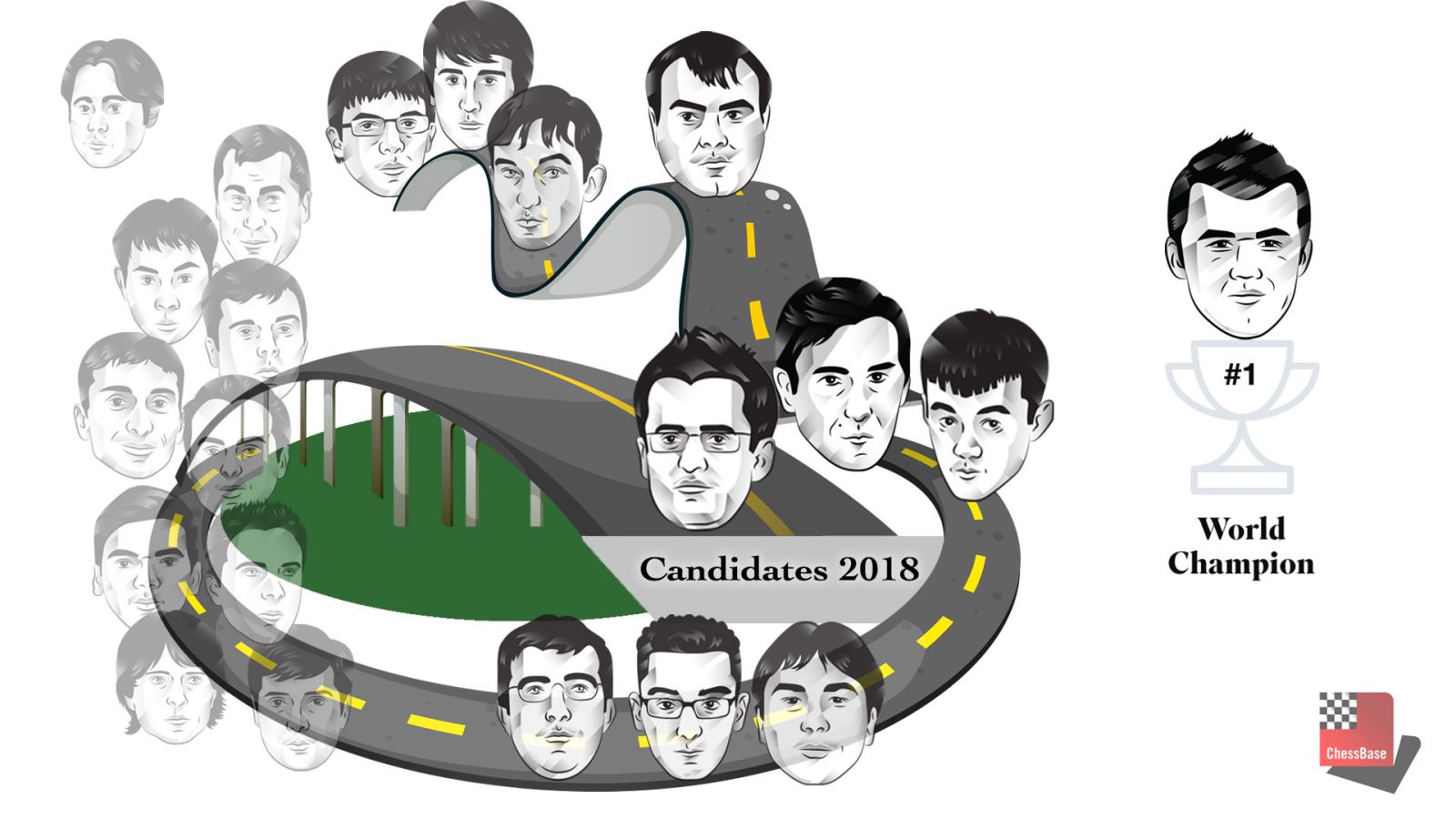
Vachier-Lagrave and Radjabov have chances in the Grand Prix, Kramnik, Caruana and So fight for two rating spots | Graphic: Macauley Peterson; Player drawings: WorldChess.com/ratings
| Advertising |